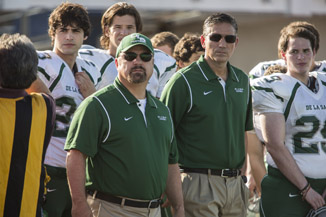|
|
The 400-Word-Review: When the Game Stands TallBy Sean CollierAugust 27, 2014
Moreover, there’s a reason that sports films are usually about underdogs: the ascension of an unlikely hero is a compelling narrative. The dominance, insignificant faltering (the winning streak is broken during the events of the film) and return to dominance of a gridiron bully is not. And, unfortunate though it may be, stories of quiet figures who inspire those around them aren’t usually too gripping, either. To make up for an almost total lack of conflict in the main narrative, screenwriter Scott Marshall Smith — who hasn’t had a script make it to feature in 13 years, and for good reason — peppers in undercooked subplots to kill time. One student is slain in a random act of violence; another clashes with an overbearing father; Ladouceur has a medical scare; a hotshot wide receiver gets a dose of humility. None of it adds to anything, only prolonging the unpleasant moments the audience will spend in the theater. As Ladouceur, Jim Caviezel hearkens back to his career-defining role as Jesus, and not accidentally (the film has a underriding religious component). Laura Dern sleepwalks through a ornamental role as the coach’s wife, Bev. Michael Chiklis and Clancy Brown hit expected, but not thoughtless, notes as the assistant coach and an angry parent, respectively.
A half-dozen times, Ladouceur settles down an emotive teen by saying, “It’s just a high school football game.” If someone had said that in a pitch meeting, it would’ve saved a lot of trouble. My Rating: 2/10 Sean Collier is the Associate Editor of Pittsburgh Magazine and a member of the Broadcast Film Critics Association. Read more from Sean at pittsburghmagazine.com/afterdark
[ Read more 400 word movie reviews ]
[ View other movie reviews ]
[ View other columns by Sean Collier ] [ Email this column ]
|

|
|
|

|
Thursday, October 31, 2024
© 2024 Box Office Prophets, a division of One Of Us, Inc.


